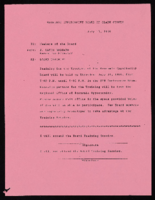Search the Special Collections and Archives Portal
Search Results
Jean Ford Papers
Identifier
Abstract
The Jean Ford Papers (1958-1996) include political documents, campaign materials for Jean Ford's political campaigns, and materials pertaining to campaign issues such as health services, general improvement districts, and parks and recreation. There is extensive material on Red Rock National Conservation Area, Lake Mead National Recreation Area, and the National Issues Forum. Women's issues cover the years 1964-1981 and contain information relating to the League of Women Voters, Equal Rights Amendment (ERA), and International Women's Year (IWY), as well as Anti-ERA and Anti-IWY materials.
Archival Collection
C. A. Earle Rinker Photograph Collection of Goldfield, Nevada
Identifier
Abstract
The C. A. Earle Rinker Photograph Collection of Goldfield, Nevada (approximately 1900-1915) contains individual black-and-white photographic prints, photographic albums, black-and-white and tinted postcards, and photographic negatives that document the history of early twentieth century Goldfield, Nevada. The images include photographic prints of Goldfield and surrounding areas during its peak years of 1906-1910; postcards showing scenes of Goldfield, Tonopah, and other areas in central Nevada; and negatives that contain images of Rinker's family and homelife in Indiana and Illinois.
Archival Collection

Economic Opportunity Board of Clark County (Nev.): memos, agendas, and meeting minutes
Date
Archival Collection
Description
From the Clark County Economic Opportunity Board Records -- Series I. Administrative. This folder contains memos, agendas and minutes from meetings of the Clark County Economic Opportunity Board from July 1969 through December 1969
Text

Transcript of interview with Michael J. Signorelli by Claytee D. White, Stefani Evans, August 4, 2016
Date
Archival Collection
Description
Michael Signorelli, long-time Las Vegas resident and builder of many local homes, apartments and hotels, describes his upbringing, career, and stellar reputation as part of the “Building Las Vegas” oral history project. Raised in Rhode Island, the only child of an Italian-American father and a Southern Baptist mother, Michael’s early life was influenced by his father’s disability as a World War Two veteran and his non-English speaking paternal grandparents, who owned and ran a grocery store. Talking of his experiences in helping them run the grocery store he says, "I became a businessman at the age of twelve." His military service during the Vietnam War landed him at Nellis Air Force Base in Las Vegas. Once here, Michael furthered his education at UNLV, obtaining both his MEd and PhD degrees. In Las Vegas Michael began his work in the housing arena working for Sun Home Builders and his non-profit work, helping to raise funds for the newly formed Rape Crisis Center. Signorelli went on to work for Howard Hughes's Summa Corporation, where he successfully fought against a discrimination lawsuit brought by twenty-one female dealers. In 1978 Michael started his own company, Nicro Corporation, and began building homes in the Las Vegas valley with land he acquired on a hand-shake and a verbal contract. He continued his non-profit work, which included coordinating Lady Bird Johnson’s Green Thumb project for Nevada and the Pacific Northwest. In the 1980s Signorelli was recruited by the Fitzgerald Group, where he was involved in non-gaming operations for their many hotels, cattle ranch, and an in vitro clinic. In this interview, Signorelli describes his non-Las Vegas building projects in Mesquite and Laughlin. He built the Mesquite Star hotel and casino by overcoming multiple hurdles around water access and money. Despite twice obtaining a loan for one hundred million dollars, he was never able to successfully complete the Laughlin hotel and casino, due to legal issues from his partner’s family trust. Signorelli also shares his idea for a unique hotel and casino called the Nev Star that involved his successful negotiation of a waiver to Senate Bill 208. Signorelli concludes his interview by talking about his ownership of the world-famous Golden Steer Steak House restaurant, which opened in 1958. Under Signorelli’s ownership the Golden Steer has been featured in national publications and claims many legendary fans such as NACAR driver Mario Andretti, who in 2016 celebrated his seventy-six birthday at the Golden Steer. Signorelli’s love of Las Vegas and its many positive traits come forth as he talks about his daughter and her achievements and suggests Vegas promoters should do a better job about what great schools, medical care, and government we have in Las Vegas.
Text

Transcript of interview with Sharon Maurer-Schwartz and Edna Rice by Barbara Tabach, February 1, 2016
Date
Archival Collection
Description
Born in 1939, Sharon Maurer-Schwartz’s life experiences have traversed a groundbreaking era: she’s a female, Jewish and a married to a Protestant lesbian. This oral history reveals what it has been like for her as she explored her Judaism and recognized her personal identity. Her Judaic foundation began in the Reconstructionist movement in Indianapolis, Indiana. She has never wavered from her religious identity, though she has belonged to various types of synagogues. She and Ande (Edna) Rice, who also participates in this interview, were legally married in California in 2008, but have been together since the 1980s. They raised Sharon’s daughter Julie, pursued careers and moved to Las Vegas in 1999. Ande is a Protestant and the topic of blended religious couples is discussed. Sharon is devoted to her life coaching business – Growth Unlimited – and to helping others.
Text

Transcript of interview with Norma Morrow Zuckerman by Barbara Tabach, April 18, 2016 & March 13, 2017
Date
Archival Collection
Description
Norma Morrow Zuckerman is the driving force behind the Jewish Repertory Theatre of Nevada [JRTN], an organization she co-founded with Charlene Sher in 2010. The endeavor coincided with Norma’s pursuit of an MFA at UNLV a couple of years prior. With the commitment to her studies and to bring professional Jewish theatrical performances to Las Vegas, her energetic personality intensified. In 2007, she performed in The Diary of Anne Frank and noted the audience was supporting Jewish Family Services Agency. Norma could sense the community’s eagerness for professional theatre and she was just the one to deliver it. Over the following years, JRTN produced an array of Jewish-themed and acted plays. Since then she tries to bring The Diary of Anne Frank to the stage annually and finds partners to bring 1400 eighth graders to the performance. By 2012, her commute between Los Angeles, where she is a garment designer/manufacturer with her husband Eugene, and Las Vegas had become routine and her passion for professional theatre in Las Vegas increased. This was the year that The Smith Center for Performing Arts opened. The first theatrical production was Golda’s Balcony, a one-woman drama starring Tovah Feldshuh. It was the spectacular co-promotion by Norma’s JRTN and the Smith Center. Norma was smitten with the theatre from a young age and studied with some of the best acting coaches—Milton Kastelas, Stella Adler, Wynn Handman. In this oral history she recalls the people who have helped her, the performances that have charmed audiences and the value of live theatre.
Text

Jack Weinstein and Polly Weinstein interview, April 12, 2018: transcript
Date
Archival Collection
Description
Tower of Jewels is one of those iconic Las Vegas businesses that continues to thrive. At the time of this interview, Jack Weinstein is in his nineties and “retired.” With him is his daughter Polly Weinstein, who in addition to being involved in the business management has her own custom designed jewelry line, aptly named The Jeweler’s Daughter. As the youngest of six children born to Jewish Russian immigrants Joseph and Pauline (Polly is named for her grandmother), Jack was raised in a dangerous neighborhood of Detroit, Michigan. His youthful enterprise included collaborating and then splitting up with his brothers in a jewelry business, before eventually moving west to Los Angles in the early 1960s. On his own, Jack became a wholesale salesperson representing lines of watches to other businesses. Included in his list of clients was Al Sanford’s Tower of Jewels in Las Vegas. The two became friends and Al suggested setting up a partnership between Al’s son and Jack in 1964. Eventually
Text

Mario Sandoval interview, December 6, 2018: transcript
Date
Archival Collection
Description
Interviewed by Claytee White. Mario and his six siblings were reared by a single mother who taught him all of the family recipes. Moving to Las Vegas at four years of age Mario remembers moving into a black neighborhood where the family was not welcomed. All windows in their home were broken into the first night. The family moved the next day. Though the new house was still in an African American neighborhood, they were protected by Vera, their black babysitter. Mario developed the intense work ethic of his mother, and after working in several strip casinos, found his home at the Horseshoe, today's Binion's. He has been there for 33 years; first as a busboy and then becoming a waiter. He is a Culinary Union trained shop student who picketed his beloved work place for ten months during a 1980's labor dispute. His work in life and union benefits have made his a very good life.
Text

Sylvia Alvarado interview, April 12, 2019: transcript
Date
Archival Collection
Description
Interviewed by Rodrigo Vazquez, Monserrath Hernández, and Barbara Tabach. Sylvia Alvarado talks about growing up in North Las Vegas and her Catholic upbringing in a Mexican household. Her studies in Journalism & Media Studies led her to her career as a radio host on English and Spanish-speaking programs. She also talks about speaking "pocha" Spanish and the Latinx influence in radio programming.
Text

David Ober interview, October 11, 2017: transcript
Date
Archival Collection
Description
Tucson, Arizona, native David Ober moved to Las Vegas twice. He arrived reluctantly the first time in 1978 with his parents as a high-school student, when his father, Hal Ober, came to Las Vegas to begin building and marketing the U.S. Home (now Lennar) brand. While the elder Ober soon left U.S. Home to open his own home-building business, R.A. Homes, his youngest child left Las Vegas shortly after his high school graduation to return to his native Tucson, follow in the footsteps of his siblings, and attend the University of Arizona. After graduating from the University of Arizona David Ober opened his own mortgage company and began building a life in Phoenix. In the late 1980s he agreed to take a large pay cut, return to Las Vegas, and learn his father's business from the ground up. At the time, Hal Ober was developing his award-winning, master-planned community, Desert Shores. David Ober, the youngest of the five children of Hal and D'Vorre (Dee) Ober, agreed to participate in the
Text
